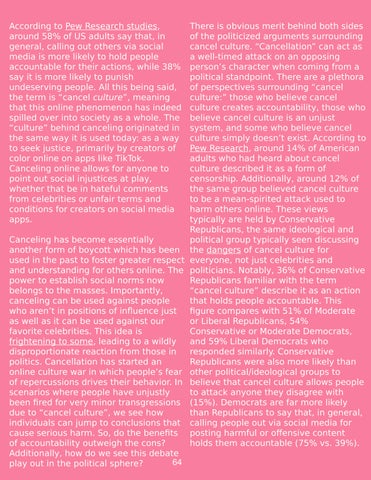According to Pew Research studies, around 58% of US adults say that, in general, calling out others via social media is more likely to hold people accountable for their actions, while 38% say it is more likely to punish undeserving people. All this being said, the term is “cancel culture”, meaning that this online phenomenon has indeed spilled over into society as a whole. The “culture” behind canceling originated in the same way it is used today: as a way to seek justice, primarily by creators of color online on apps like TikTok. Canceling online allows for anyone to point out social injustices at play, whether that be in hateful comments from celebrities or unfair terms and conditions for creators on social media apps.
There is obvious merit behind both sides of the politicized arguments surrounding cancel culture. “Cancellation” can act as a well-timed attack on an opposing person’s character when coming from a political standpoint. There are a plethora of perspectives surrounding “cancel culture:” those who believe cancel culture creates accountability, those who believe cancel culture is an unjust system, and some who believe cancel culture simply doesn’t exist. According to Pew Research, around 14% of American adults who had heard about cancel culture described it as a form of censorship. Additionally, around 12% of the same group believed cancel culture to be a mean-spirited attack used to harm others online. These views typically are held by Conservative Republicans, the same ideological and Canceling has become essentially political group typically seen discussing another form of boycott which has been the dangers of cancel culture for used in the past to foster greater respect everyone, not just celebrities and and understanding for others online. The politicians. Notably, 36% of Conservative power to establish social norms now Republicans familiar with the term belongs to the masses. Importantly, “cancel culture” describe it as an action canceling can be used against people that holds people accountable. This who aren’t in positions of influence just figure compares with 51% of Moderate as well as it can be used against our or Liberal Republicans, 54% favorite celebrities. This idea is Conservative or Moderate Democrats, frightening to some, leading to a wildly and 59% Liberal Democrats who disproportionate reaction from those in responded similarly. Conservative politics. Cancellation has started an Republicans were also more likely than online culture war in which people’s fear other political/ideological groups to of repercussions drives their behavior. In believe that cancel culture allows people scenarios where people have unjustly to attack anyone they disagree with been fired for very minor transgressions (15%). Democrats are far more likely due to “cancel culture”, we see how than Republicans to say that, in general, individuals can jump to conclusions that calling people out via social media for cause serious harm. So, do the benefits posting harmful or offensive content of accountability outweigh the cons? holds them accountable (75% vs. 39%). Additionally, how do we see this debate 64 play out in the political sphere?












